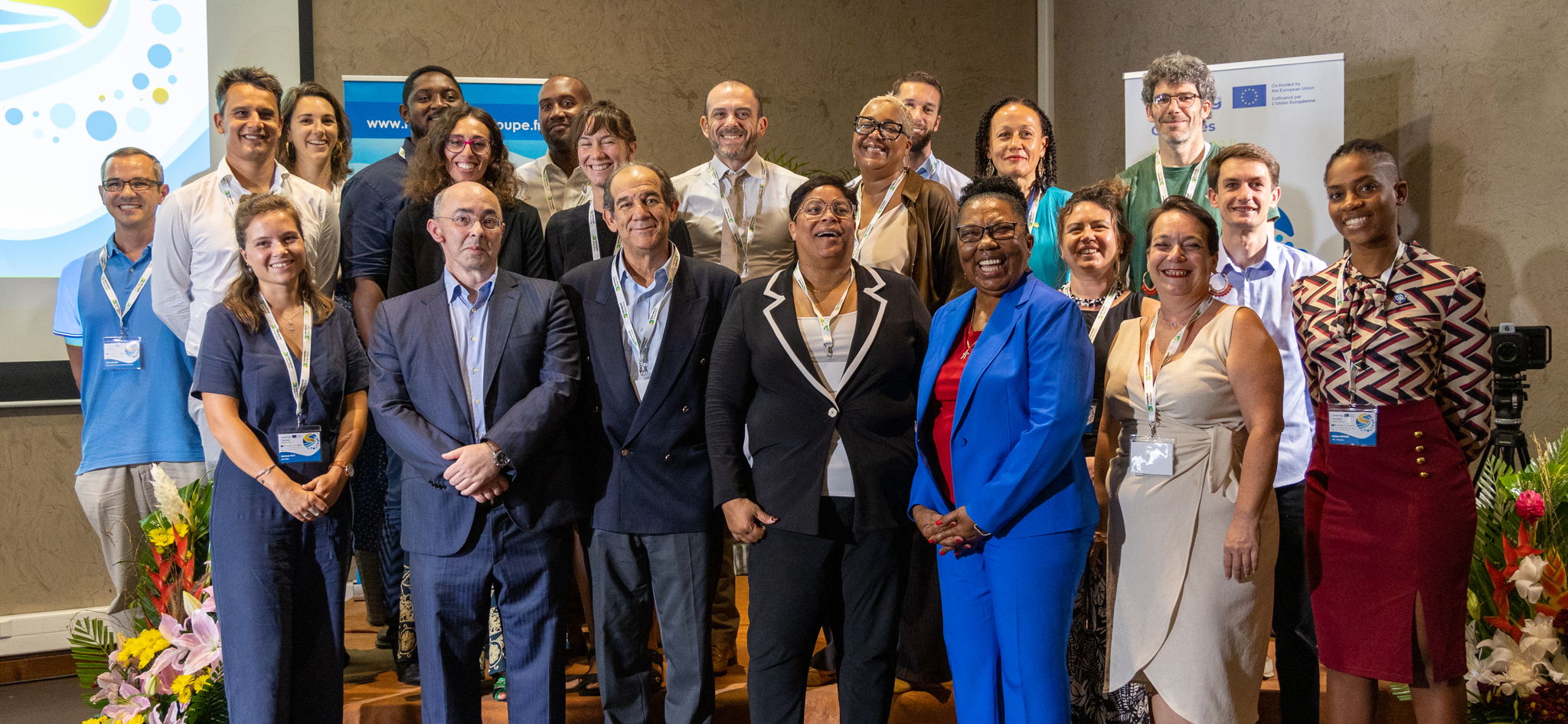The OECS Participates in the International Sargassum Sequence (ISS) in Guadeloupe
OECS Media Release
The Organisation of Eastern Caribbean States (OECS) Commission participated in the International Sargassum Sequence (ISS) at the Creole Beach Hotel in Le Gosier, Guadeloupe, from March 26 to 28, 2025. Among a series of meetings and site visits, the ISS featured the INTERREG SARGCOOP 2 (Synthesis of Sargassum and Cooperation) project launch ceremony, gathering local, regional, and international institutions engaged in the action to tackle the region's Sargassum challenge.
Director General of the OECS, Dr. Didacus Jules, delivered remarks at the launch ceremony on March 26, where he reaffirmed the commitment of the OECS Commission in tackling this pressing matter as mandated by the OECS Council of Ministers of Environment Sustainability, calling for regional and coordinated action on Sargassum.
He said, “A joint regional approach, exchange of knowledge, shared resources, pooled procurement, and standardised best practices are necessary. This aligns with the 2018 mandate of the OECS Council of Ministers of Environment, calling for a coordinated, cross-border response to Sargassum management.”
Dr. Jules also underscored the need for synergies between initiatives in a regional movement:
“At the regional level, multiple initiatives are supporting efforts to address the Sargassum challenge, including those funded by the EU, France, Germany, the World Bank, and other development partners. It is crucial that these initiatives are well-coordinated to ensure coherence in our approach, avoid duplication, and maximize impact. The OECS remains committed to working closely with all stakeholders to align strategies and foster synergies that lead to effective and sustainable solutions.”
SARGCOOP 2, which is funded under the European Union programme, INTERREG Caraïbes, is a key initiative on the Sargassum cooperation effort in which the OECS Commission is heavily involved. The SARGCOOP 2 project is led by the Regional Council of Guadeloupe with a network of 19 organisations and institutions of the Caribbean region. It is an ambitious initiative that will contribute to fostering discussions and reinforcing the partnership initiated during the first phase of the SARGCOOP 1 project that took place from 2019 to 2023.
SARGCOOP 2 will run from 2025 to 2027 with the aim of reinforcing scientific research and observation, developing the value chain, reinforcing regional governance, and strengthening the inclusion of the Sargassum issue on the international agenda.
The OECS Commission was also represented by Mrs. Helena Jeffery Brown, Programme Director for Biodiversity, Ecosystems, and Ecosystem Services in the Environmental Sustainability Division (ESD), who underscored the significance of the OECS's role in the SARGCOOP 2 project:
“SARGCOOP 2 is designed to be even more ambitious, comprehensive, and impactful. It aims to reinforce and extend our capacity for regional governance, ensuring that we not only manage the crisis more effectively but also turn this challenge into an opportunity for collaboration, innovation, and sustainable development.”
“The OECS is involved in several work packages, including the Cluster, Internationalisation, and Effects & Impacts, to strengthen regional Sargassum coordination.”
SARGCOOP 2 is integrated into the OECS Commission's broader strategy, which includes several initiatives aimed at addressing the Sargassum issue in the region. This includes a project funded by the French Agency for Development and implemented by Expertise France, which supports Saint Lucia, Grenada, Saint Vincent, and Dominica in operationalising integrated Sargassum management and valorization frameworks. Also, as part of the Biospace Project, a biodigester has been procured for Saint Lucia to support sustainable Sargassum valorization practices. As part of our Blue Economy focus, the OECS is also committed to incorporating Sargassum as a thematic area during the UBEC’s midterm review and restructuring in 2025.
Among other initiatives, the SARGCOOP project aims to capitalise on the outcomes of the Resagro Sargassum project (the UN-ECLAC economic impact study) and explore synergies with the European Union's Global Gateway investment programmes, which were discussed at the 2nd EU-Caribbean Global Gateway Conference on Sargassum in Grenada on October 1 and 2, 2024.
Dr. Jules called for innovative solutions in managing Sargassum and emphasised the economic potential that could turn a crisis into an opportunity.
“We must reframe how we view Sargassum, it is not just a nuisance but an untapped economic resource. Private sector engagement is critical, and we must encourage research and investment in the commercialization of sargassum-based products and value chains.
"Already, we are exploring its potential as a biofuel source, with research and pilot initiatives pointing to the use of Sargassum-derived natural gas for powering electric vehicles. This is a clear opportunity to align Sargassum solutions with our sustainable energy and climate resilience goals while ensuring proper biodiversity management.”
Claudia Mc Dowell
OECS Communications Unit












